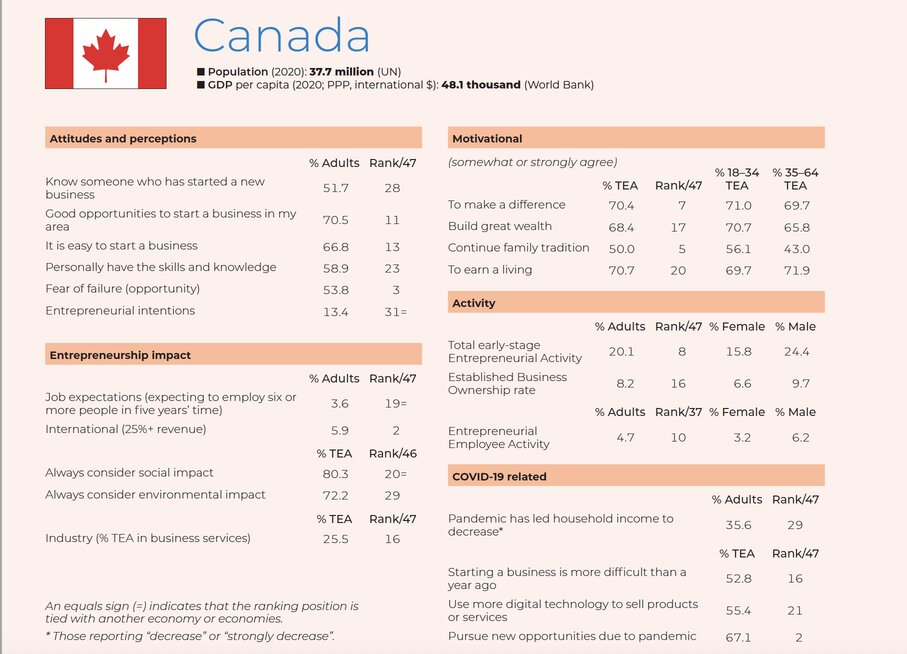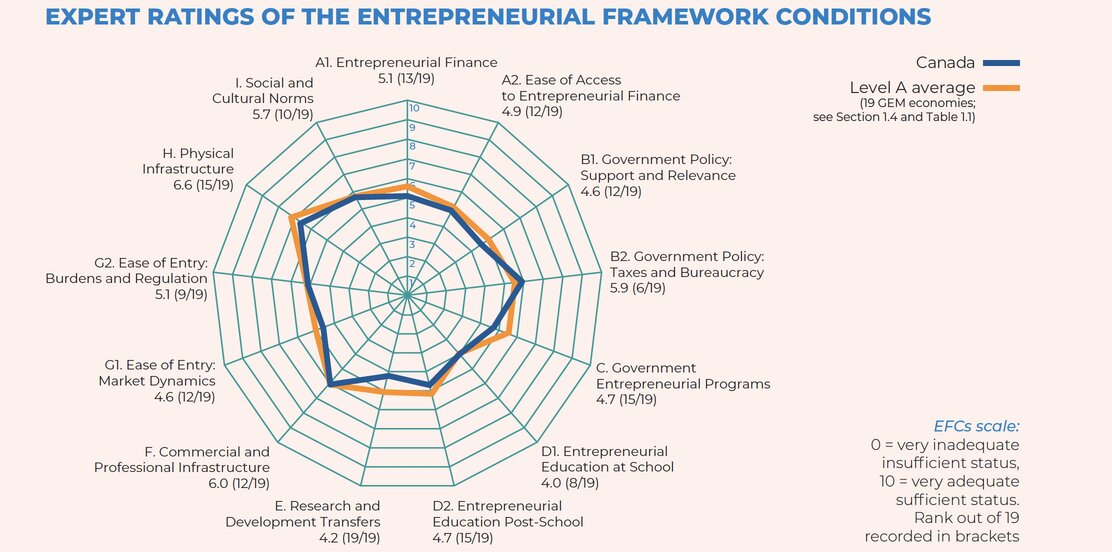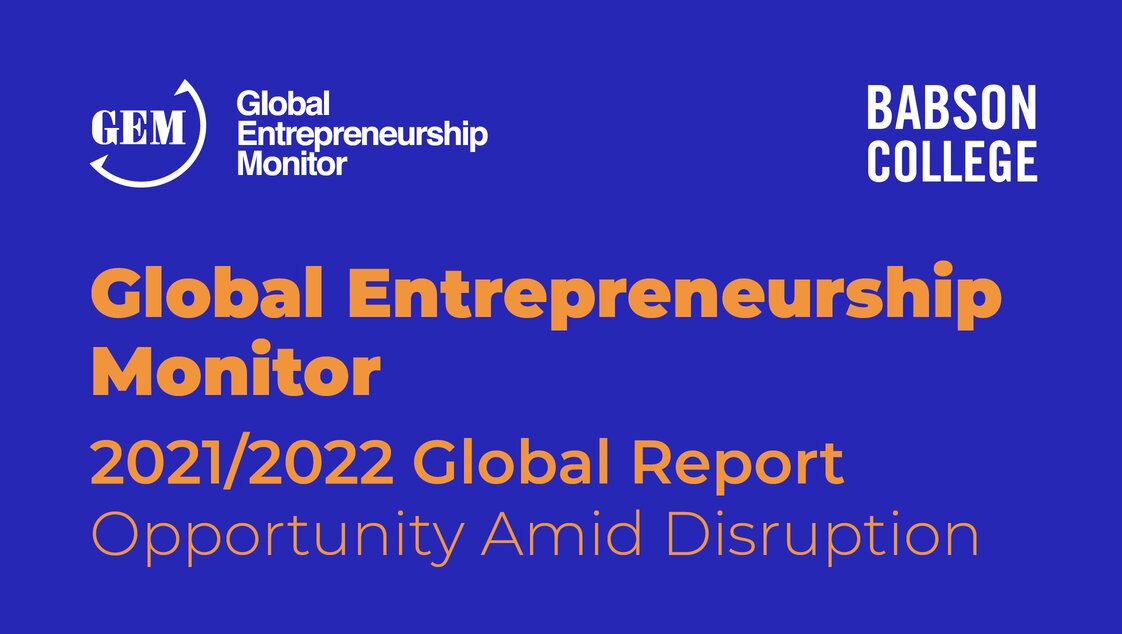The 23rd Global Entrepreneurship Monitor (GEM) Global Report presents, analyses and assesses results from 50 individual economies spread across the world, representing some 68% of global GDP and 45% of the world’s population. In this 23rd Global Report, Global Entrepreneurship Monitor (GEM) offers a substantial and contemporary body of evidence-based on extensive interviews in 2021 with some 150,000 individuals across 50 different economies, which together represent around 68% of global Gross Domestic Product (GDP) and 45% of the world’s population.
GEM carries out survey-based research on entrepreneurship and entrepreneurship ecosystems around the world. GEM is a networked consortium of national country teams primarily associated with top academic institutions. It is the only global research source that collects data on entrepreneurship directly from individual entrepreneurs.
Key Takeaways
The 23rd annual GEM Global Report draws comparisons between 50 economies that participated in GEM’s 2021 research, during the global COVID-19 pandemic
According to GEM, Entrepreneurship is the act of starting and running a new business, i.e. not just thinking about it, or intending to start, but expending resources to get a new business off the ground.
Importance of Entrepreneurship
New businesses bring new jobs, increased incomes and added value, often by introducing new ideas, technologies and products to society. The successful new business hastens structural change, harnessing resources to produce the goods and services that people want but, crucially, which they are also prepared to pay for.
COVID-19 Pandemic
The coronavirus pandemic has had multiple impacts on entrepreneurship, ranging from stifling or constraining the intentions of entrepreneurs to create businesses, to providing new market opportunities for those nimble and creative enough to respond quickly to changing circumstances.
- In 2021, more than one in two entrepreneurs agreed that starting a business had become more difficult in 18 of 47 economies. In 2020, almost twice as many (33 out of 46 economies) had 50% or more of their would-be entrepreneurs agreeing that this was the case.
Many people around the world are working differently as a result of the pandemic. The rise in online business and working from home may be the most important and transformative shifts of the century
The promotion of entrepreneurship will be central to multiple governments worldwide for the foreseeable future, especially considering the significant negative impacts of the pandemic on economies. Governments and other stakeholders will increasingly need hard, robust and credible data to make key decisions that stimulate sustainable forms of entrepreneurship and promote healthy entrepreneurial ecosystems worldwide.
Most Supportive Places to start a business
In 2021, of the 47 GEM-participating economies, national expert assessments suggest that the United Arab Emirates has the most supportive environment for entrepreneurship and Sudan the least supportive, with many degrees of supportiveness in between.
The United Arab Emirates has the highest total score by a clear margin, having improved in 11 of the 13 framework conditions since 2020, and scoring highest of all 47 economies in four of them. The United Arab Emirates is the only economy to have scored as sufficient or more for all framework conditions. These changes are the direct result of policy adjustments that have moved increasingly to promoting business conditions for entrepreneurs.
Business is Personal
Starting a new business is a highly personal decision which reflects an individual’s drive, competence and motivation. However, new entrepreneurs create business within a context of social values and frameworks that may promote or hinder an entrepreneurial mindset: for example, by encouraging or discouraging creativity or risk-taking.5 Entrepreneurs operate within an entrepreneurial ecosystem that may provide or restrict access to resources, including finance and expertise.
Stages of the entrepreneurial journey, from having an idea, to seeing opportunities (conception), to starting a business by devoting resources to pursuing those opportunities (firm birth), to developing that new start into an established business (persistence) or, sometimes, a business exit.
In its research, GEM distinguishes between three stages of entrepreneurial activity:
- Nascent Entrepreneurs: those who have actively devoted resources to starting a business but who have not yet paid wages or salaries for three months (including to themselves);
- New Business Owners: those starting and running a business and paying wages or salaries for three months or more;
- Established Business Owners: those running a business that has paid salaries for 42 months or more.
Total early-stage Entrepreneurial Activity
Total early-stage Entrepreneurial Activity, or TEA, which is the proportion of adults in a particular economy that are starting or running a new business (or the sum of Nascent Entrepreneurs plus New Business Owners).
- Level A: economies with a Gross Domestic Product (GDP) per capita of more than $40,000;
- Level B: economies with a GDP per capita of between £20,000 and $40,000;
- Level C: economies with a GDP per capita of less than $20,000.
Where are entrepreneurial activity rates highest?
In terms of the proportion of adults starting or running new businesses, the highest rate among the 47 economies is in the Dominican Republic, where more than two out of five adults are starting or running a new business. The lowest rate is in Poland, where just one in 50 is doing so.
Which sectors are the most popular for starting a business?
Durable new businesses tend to be in niche markets, requiring high levels of human and financial capital, selling differentiated products for which consumers or businesses are prepared to pay a premium. Many of these businesses are in business services rather than in consumer services.
If entrepreneurial innovativeness is measured in terms of the proportion of adults in an economy who are either introducing products or services or using technologies and procedures, that are at least new to the area, then the stand-out economies in the 47 GEM 2021 participants are Chile, the Dominican Republic and Canada, while the least innovative are Poland, Kazakhstan and Norway.
Are younger people more likely to start a business?
As with levels of entrepreneurial activity as a whole, the highest rates for younger people are in the Dominican Republic, Sudan, Guatemala, Chile and Canada, while the lowest rates are in Norway and Poland. Rates for older people (aged 35+) paint a similar picture. However, the rate of entrepreneurial activity among the younger group exceeds that of the older group in 36 of the 47 economies, although the differences are often small.
The entrepreneurial rate among the younger group is around double or more of that of the older group in five economies (Italy, Croatia, Poland, Slovenia and Canada).
Younger entrepreneurs (aged 18–34) are more likely to agree with the aspirational motive “to make a difference in the world”, while older entrepreneurs favour “Earning a living because jobs are scarce”. Differences between motivations between the age groups may also play some part in explaining differences in levels of entrepreneurial activity between them.
Why Start (or Stop) a Business?
Entrepreneurs by their very nature are both passionate and creative when it comes to starting businesses. Their world can be exciting and dynamic, with many drivers at play. For this reason, there can be a wide variety of motives for starting a business: trying to make a difference in the world, building great wealth or income for themselves, their families and community, continuing a family tradition or generating an income when jobs are scarce. These reasons are all common. However, the most popular reason for starting a business is the desire of the entrepreneur to have independence and autonomy.

Canada 2021 Entrepreneurial Activity Review
In 2021 Canada had the highest TEA rate among all GEM Level A economies, 20.1% — its highest level since the country began participating in GEM.

A growing economy and strong government policy support, including hiring and wage subsidies for new businesses, appears to have encouraged many more Canadians to start new businesses after 2020 proved too difficult.
Looking to build your successful tech Startup? Join our 12-week cohort of tech startups for Black founders by Black industry experts.
